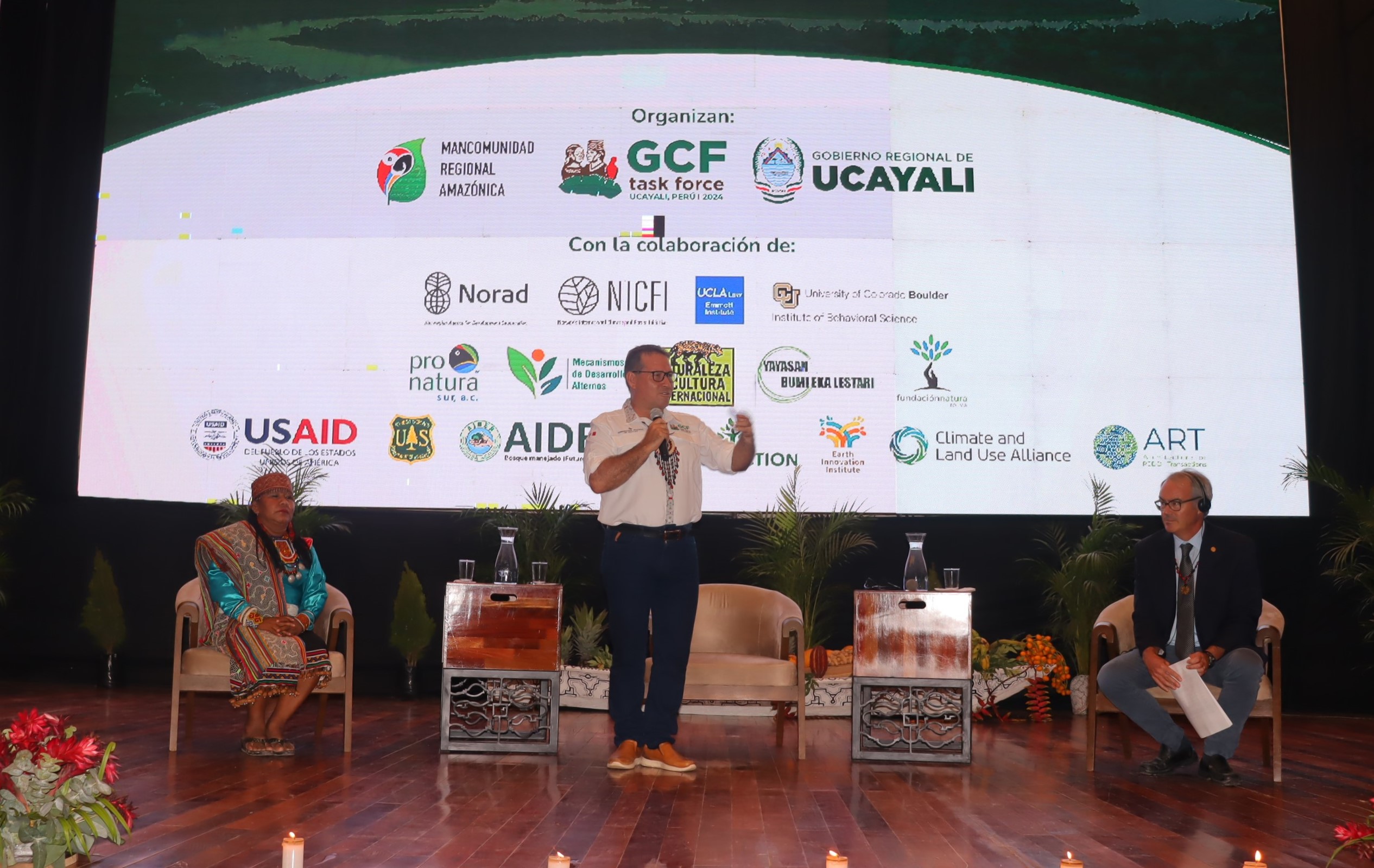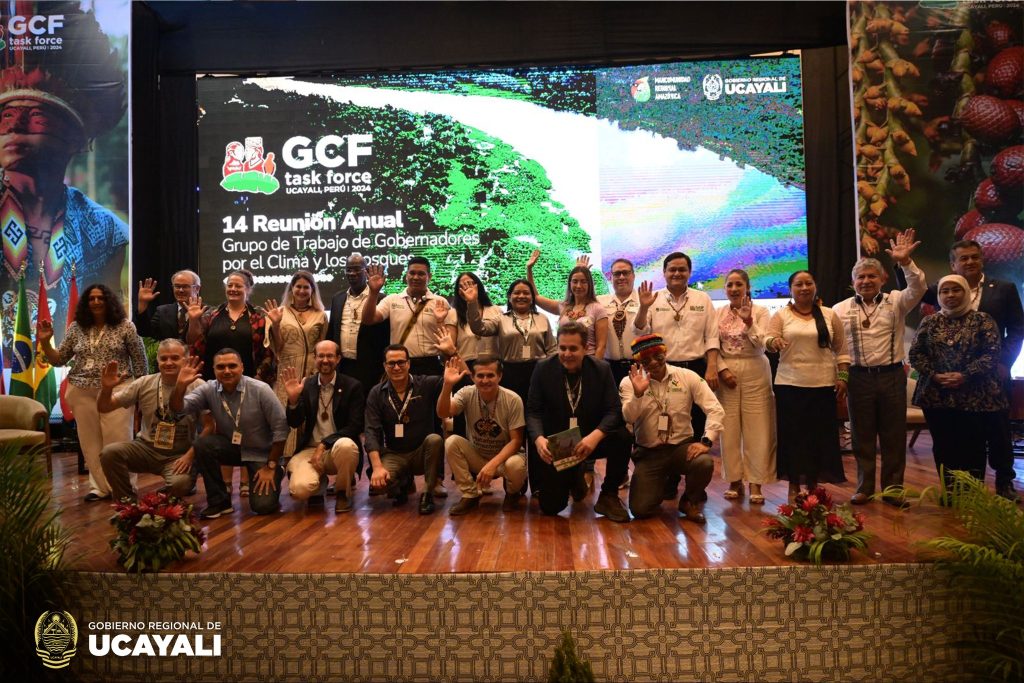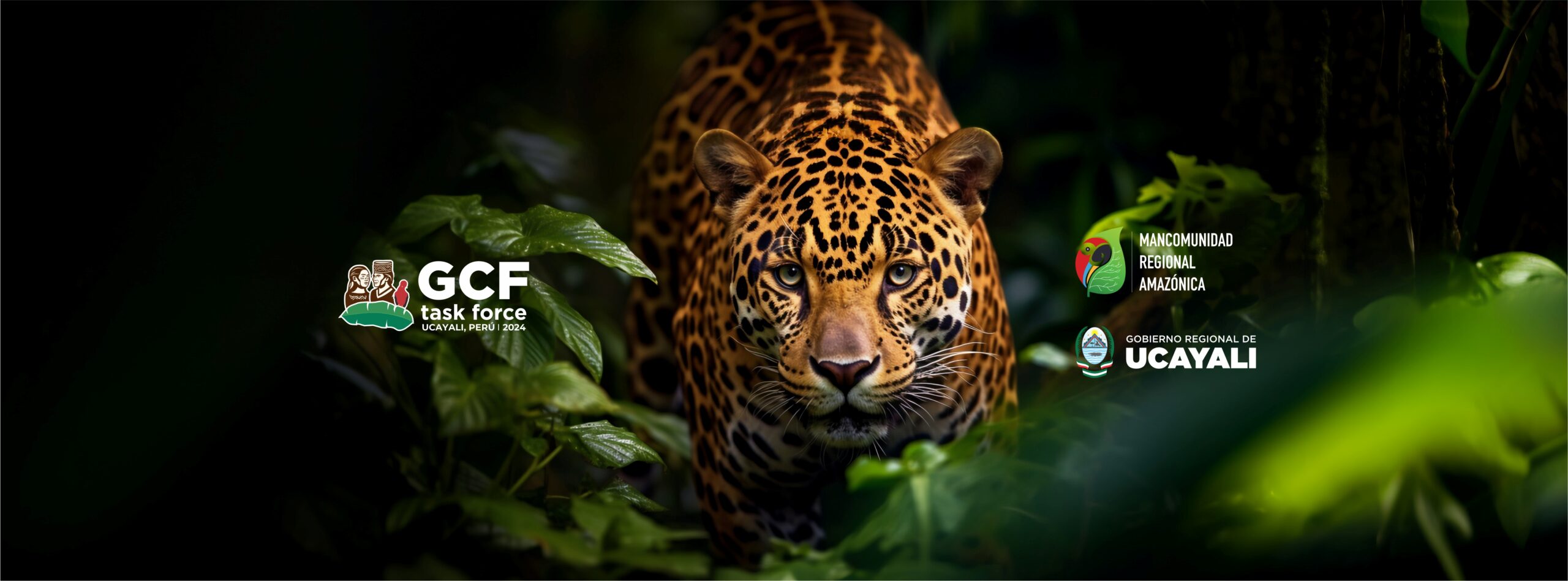October 2024. Results of the 14th Annual Meeting of the Governors’ Climate and Forests Task Force
Throughout the week of October 7-11, 2024, members and partners of the Governors’ Climate and Forests Task Force (GCFTF) gathered in Pucallpa, Ucayali, Peru for our 14th Annual Meeting of this unique subnational network of 43 states and provinces from 11 countries. Current GCFTF Chair, Governor Manuel Gambini, and the teams of the Regional Government of Ucayali and the Mancomunidad Regional Amazonica, hosted the activities of the week. From nearly 1,000 participants in the first Indigenous summit organized on Tuesday, to technical exchanges on 7 highly substantive field visits, to important partnerships between and amongst subnational and national government actors and the private sector, this meeting continued to advance our goals of highlighting the realities of challenges and investment opportunities on the ground in order to develop a New Forest Economy that protects forests, increases opportunities for communities and companies, and does so in a sustainable way.
The meeting also served as the launch of our Blueprint for the New Forest Economy, which synthesizes nearly two years of political commitments and technical exchanges around forest and carbon finance into a practical guide for jurisdictions and partners to continue exploring mechanisms to drive finance into shovel-ready action in the tropics quickly and at scale. The Blueprint, formally announced on Friday, October 11, identifies four building blocks for a New Forest Economy: Bioeconomy, Natural Infrastructure, Restoration, and Intensification. It outlines some of the new and existing funding mechanisms that could be used to support promising initiatives in these four key areas, and calls for the creation of the following mechanisms to get us started:
- Bioeconomy Innovation Hubs to link government, private sector actors, communities, civil society, and academia through a research and grantmaking collaboration with a focus on innovating new products, supply chains, logistics operations, e-commerce platforms, and traceability tools to drive bioeconomy investments and jobs.
- Natural Infrastructure Finance Facilities that would act as public financing entities that would channel funding to state and local governments and their partners to support the development of Payment for Ecosystem Services schemes.
- Forest Restoration Authorities that pair agile upfront investment opportunities with longer-term repayment based on the ecosystem benefits stemming from restoration results.
- Sustainable Commodity Hubs that bring together producers, commodity companies, transparency organizations, and community organizations with agricultural research networks to leverage public science and research with private sector investments that will benefit producers, communities, and regional economies.
In light of the increasingly devastating impacts of the climate crisis to our member jurisdictions, their communities, and the world, including the catastrophic fires throughout the Amazon, the most important thing is to get started now with accelerating finance and action, and to adopt a continuous improvement approach as we move forward and learn from experience. Find more on our New Forest Economy webpage, and our Blueprint resources webpage.
Additional key decisions
On Monday, October 7, the GCFTF Global Committee of Indigenous Peoples and Local Communities, which is comprised of representatives of subnational governments, regional and international Indigenous organizations, and local community representatives, agreed to:
- Accept the Confederacion de Nacionalidades Indigenas de la Amazonia Ecuatoriana (CONFENIAE) and the Gobierno Autonomía Indígena Originaria Campesina de Charagua Iyambae of Bolivia as non-voting members of the committee, pending further discussion on establishing procedures to accept representatives of the GCFTF subnational member governments of Bolivia and Ecuador. President Jose Esach of CONFENIAE expressed the necessity of integrating representation from Ecuador in this global network.
- Establish a Guide of best practices for implementing the GCFTF Guiding Principles for Collaboration and Partnership between Subnational Governments, Indigenous Peoples and Local Communities and for selecting representatives for the Global Committee.
- Share more information on the recently launched REDD+ Indigena concept note submitted by the Grupo Peru (AIDESEP, CONAP, ANECAP) and the Ministry of the Environment to the ART/TREES Secretariat. GCFTF regional governments of Peru are interested in learning more about this concept note and working together to support jurisdictional REDD+ programs.
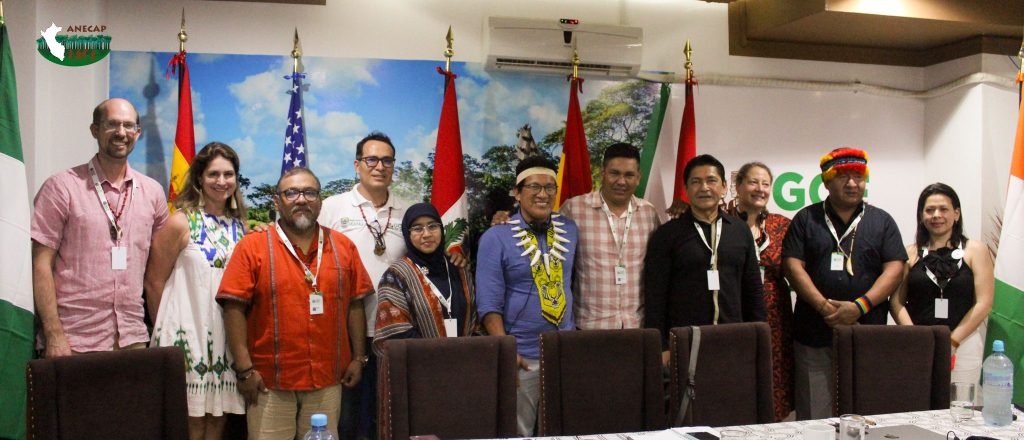
See here for a description of the events of Tuesday, October 8, and here for an overview of the technical field visits on Wednesday, October 9.
On Thursday, October 10, Governors and high-level delegates from 38 member jurisdictions reconvened for our annual Business Meeting/General Assembly meeting. During this event, newly elected Governors and Prefects were able to connect with peers, share updates on current conservation and development initiatives, and discuss the network’s growth and fundraising strategies.
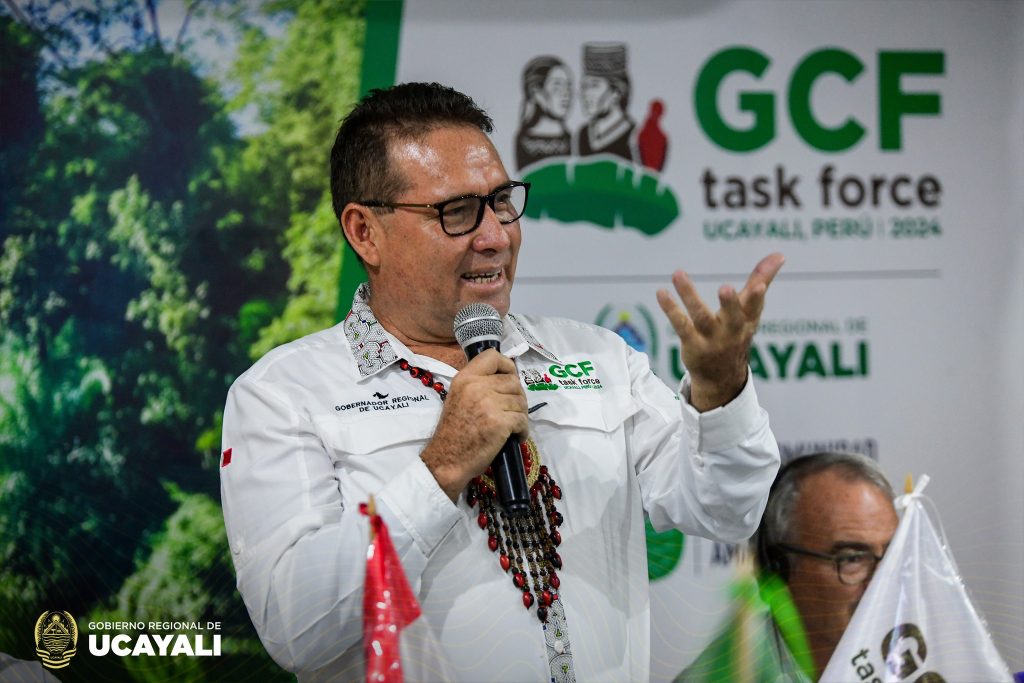
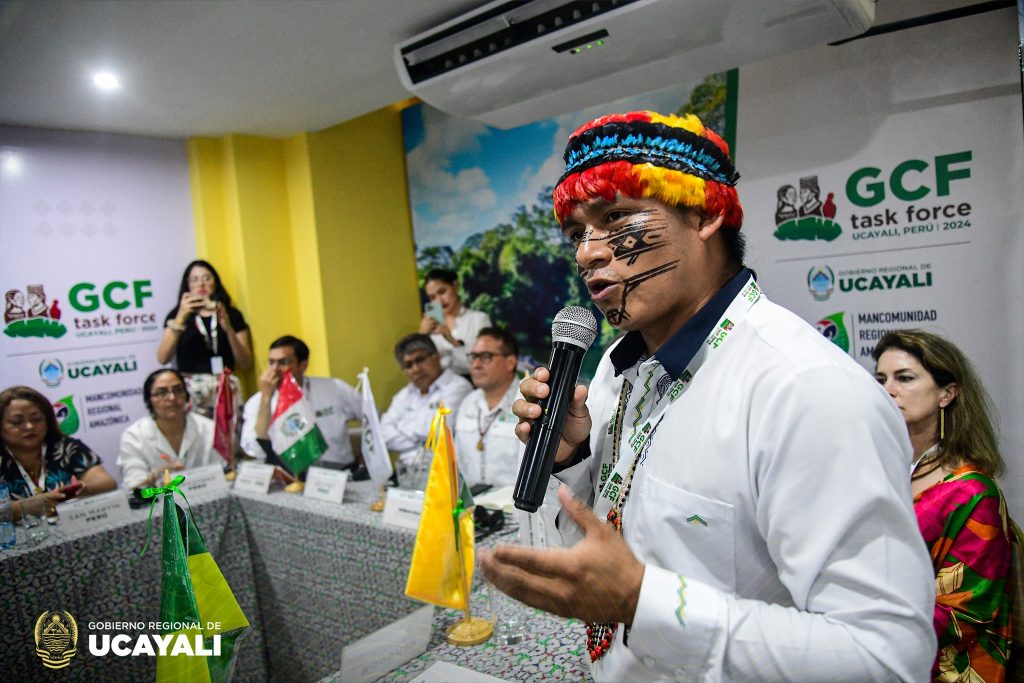
In addition, our members voted to accept applications from 5 new subnational jurisdictions seeking to join the GCFTF as observers. This is the first step in the governance process of the network before becoming full voting members. These new observers include:
- Beni, Bolivia
- Valle del Cauca, Colombia
- Orellana, Ecuador
- Lambayeque, Peru
- Libertad, Peru
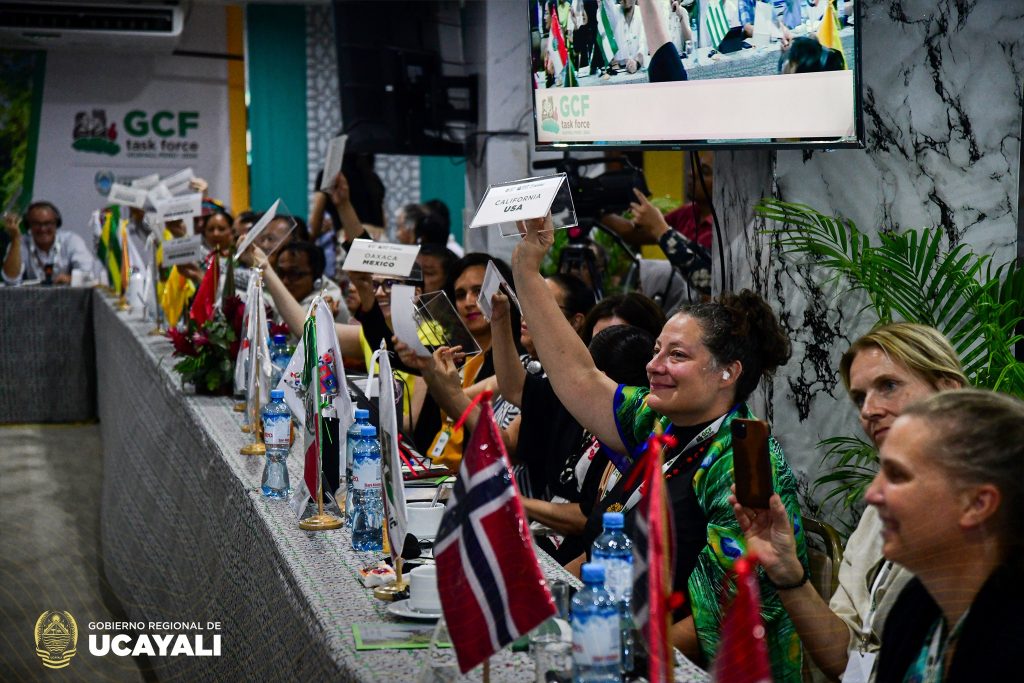
Congratulations to the new observers!
Finally, on Friday, October 11, we held our public sessions with panels featuring Governors and Global Committee members in the morning, a series of high-level announcements, and a set of closing substantive panels and ceremonies after lunch. Key high-level announcements from the GCFTF network in the Amazon basin included:
- Accord to combat illegal logging in Peru. Gobernador Gambini, on behalf of the Mancomunidad Regional Amazonica, and Vice Minister of the Agrarian Development and Irrigation, Christian Garay, and the Organismo de Supervisión de los Recursos Forestales y de Fauna Silvestre, signed an agreement to combat illegal logging and associated commercial activities. This accord represents an important moment in increasing subnational and national cooperation on this important initiative in Peru and increasing use and access to monitoring and detection tools.
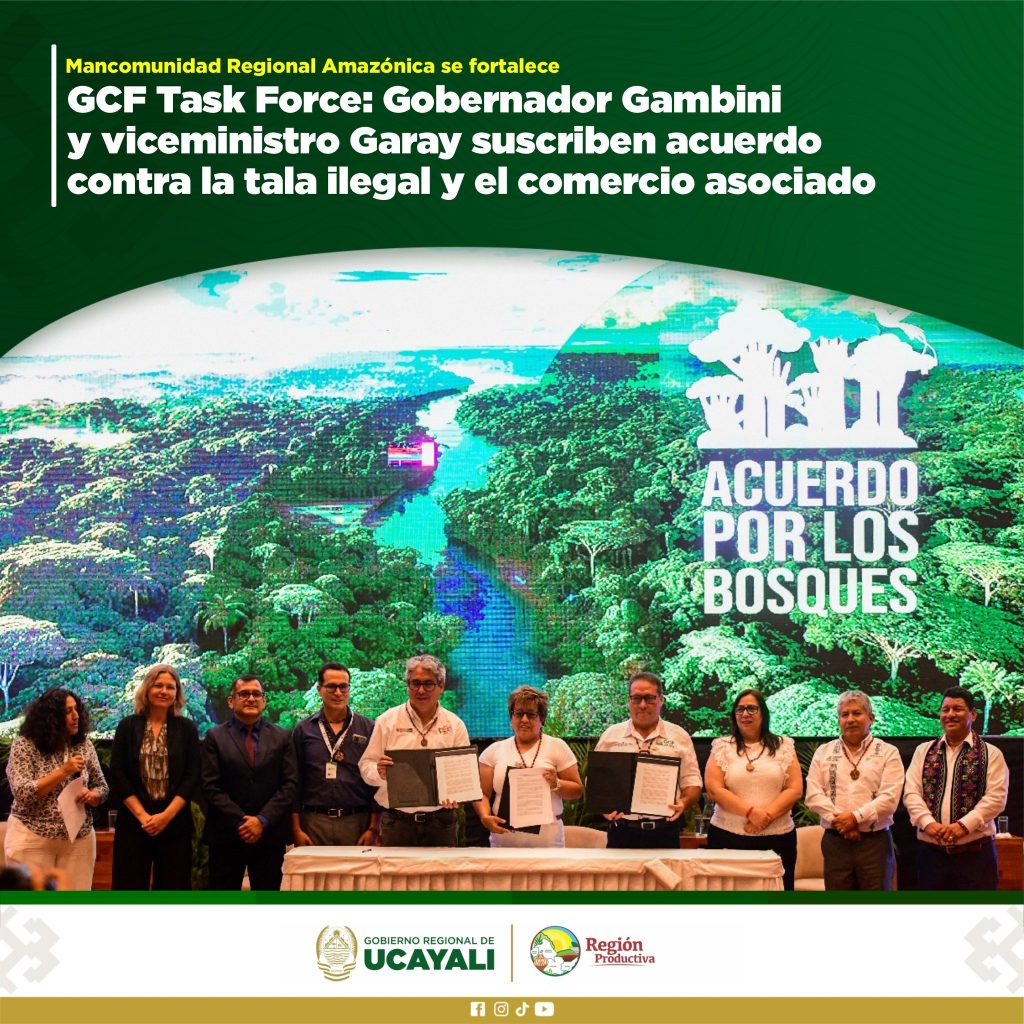
- Memorandum of Understanding between Prefects and CONFENIAE in Ecuador to advance in the joint governance of the Plataforma Amazonica. This MOU increases leadership efforts and cooperative approaches to managing millions of hectares of protected areas.
- Creation of the Bolivian Alianza Chaco Amazonica across the three current Bolivian members (Pando, Santa Cruz, and Tarija) and incoming observer, Beni. This alliance will serve as an important platform for the GCFTF members in Bolivia to increase internal cooperation and action.
- Selection of Fundación Natura Bolivia as the official coordinating partner for the GCFTF in Bolivia. Fundación Natura will continue supporting the Bolivian regional governments in their GCFTF work within Bolivia and with other regions. We are thrilled to welcome Fundacion Natura in this role!
- We also announced new partnerships with KPTL, a Brazilian venture capital firm focused on environmental impact investment.
- We had a number of technical partners participate throughout the week to support members and communities with state-of-the-art remote sensing and technological tools, including CTrees, WWF’s Forest Foresight program, and the PANGEA – NASA Terrestrial Ecology Field Campaign Scoping Study effort led by UCLA and the US Forest Service.
This year’s meeting culminated with the recognition of several leaders across the GCFTF network whose contributions are of particular note:
The “Everyday Hero Award,” which recognizes an outstanding civil servant for their work within the GCFTF, was given to Johanna Hoyos of the Regional Government of Ucayali, for her outstanding efforts in supporting not only the Annual Meeting, but also forest protection and development efforts across Ucayali.
The “Senior Leadership Award,” which recognizes the tireless and inspiring efforts of senior jurisdictional leaders, was given to the Executive Director of the Mancomunidad Regional Amazonica, Luis Briceño, and the Secretary of Environment and Natural History of Chiapas, Maria del Rosario Bonifaz.
The “IPLC Leadership Award” was presented to Diana Mori, who has long led efforts within Ucayali and beyond to raise up the voices of Indigenous women and serves as a model for the GCFTF network.

We would like to thank all of our partners and sponsors, in particular the Government of Norway, for supporting these important exchanges and the resulting action on the ground. Next year’s Annual Meeting will be hosted in Acre, Brazil, in the lead up to COP30 in Belem, Para.
